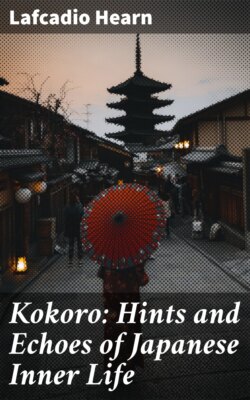Читать книгу Kokoro: Hints and Echoes of Japanese Inner Life - Lafcadio Hearn - Страница 18
На сайте Литреса книга снята с продажи.
V
ОглавлениеThese thoughts came:—
That nudity which is divine, which is the abstract of beauty absolute, gives to the beholder a shock of astonishment and delight—not unmixed with melancholy. Very few works of art give this, because very few approach perfection. But there are marbles and gems which give it, and certain fine studies of them, such as the engravings published by the Society of Dilettanti. The longer one looks, the more the wonder grows, since there appears no line, or part of a line, whose beauty does not surpass all remembrance. So the secret of such art was long thought supernatural; and, in very truth, the sense of beauty it communicates is more than human—is superhuman, in the meaning of that which is outside of existing life—is therefore supernatural as any sensation known to man can be.
What is the shock?
It resembles strangely, and is certainly akin to, that psychical shock which comes with the first experience of love. Plato explained the shock of beauty as being the Soul's sudden half-remembrance of the World of Divine Ideas. "They who see here any image or resemblance of the things which are there receive a shock like a thunderbolt, and are, after a manner, taken out of themselves." Schopenhauer explained, the shock of first love as the Willpower of the Soul of the Race. The positive psychology of Spencer declares in our own day that the most powerful of human passions, when it makes its first appearance, is absolutely antecedent to all individual experience. Thus do ancient thought and modern—metaphysics and science—accord in recognizing that the first deep sensation of human beauty known to the individual is not individual at all.
Must not the same truth hold of that shock which supreme art gives? The human ideal expressed in such art appeals surely to the experience of all that Past enshrined in the emotional life of the beholder—to something inherited from innumerable ancestors.
Innumerable indeed!
Allowing three generations to a century, and presupposing no consanguineous marriages, a French mathematician estimates that each existing individual of his nation would have in his veins the blood of twenty millions of contemporaries of the year 1000. Or calculating from the first year of our own era, the ancestry of a man of to-day would represent a total of eighteen quintillions. Yet what are twenty centuries to the time of the life of man!
Well, the emotion of beauty, like all of our emotions, is certainly the inherited product of unimaginably countless experiences in an immeasurable past. In every aesthetic sensation is the stirring of trillions of trillions of ghostly memories buried in the magical soil of the brain. And each man carries within him an ideal of beauty which is but an infinite composite of dead perceptions of form, color, grace, once dear to look upon. It is dormant, this ideal—potential in essence—cannot be evoked at will before the imagination; but it may light up electrically at any perception by the living outer senses of some vague affinity. Then is felt that weird, sad, delicious thrill, which accompanies the sudden backward-flowing of the tides of life and time; then are the sensations of a million years and of myriad generations summed into the emotional feeling of a moment.
Now, the artists of one civilization only—the Greeks—were able to perform the miracle of disengaging the Race-Ideal of beauty from their own souls, and fixing its wavering out-line in jewel and stone. Nudity, they made divine; and they still compel us to feel its divinity almost as they felt it themselves. Perhaps they could do this because, as Emerson suggested, they possessed all-perfect senses. Certainly it was not because they were as beautiful as their own statues. No man and no woman could be that. This only is sure—that they discerned and clearly fixed their ideal—composite of countless million remembrances of dead grace in eyes and eyelids, throat and cheek, mouth and chin, body and limbs.
The Greek marble itself gives proof that there is no absolute individuality—that the mind is as much a composite of souls as the body is of cells.
